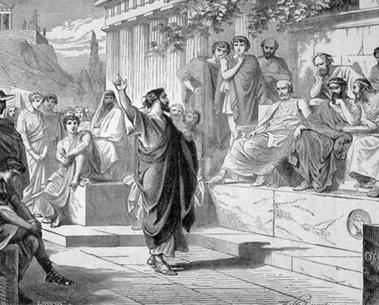Philosophy is defined as the “the study of the fundamental nature of knowledge, reality, and existence” (Soanes and Stevenson 2004). Advocates of Christian anti-intellectualism will criticize the use of philosophy within Christian circles due to Paul’s supposed admonition against philosophy. Such individuals charge that philosophy is antagonistic to the faith due to Paul’s so-called warning against philosophy in Colossians 2:8. But what exactly does the apostle claim? In Paul’s letter to the Colossians, he warns the Colossians that they should “See to it that no one takes you captive by philosophy and empty deceit, according to human tradition, according to the elemental spirits of the world, and not according to Christ” (Colossians 2:8).[1] According to philosophical antagonists, Paul’s warning against philosophy should dissuade anyone from participating in a philosophical endeavor. However, one should ask, is Paul actually condemning the use of philosophy or is Paul using the term “philosophy” to address another issue?
A closer examination of the Colossians text affords one the opportunity to evaluate Paul’s actual intention. When one examines the text, one will find three reasons why Paul does not discredit philosophy as it is popularly understood in modern times. Rather, one will discover that Paul actually advocates the use of good philosophy.
Paul’s Intention Behind the Word “Philosophia.”
As I was preparing this article, I had the chance to discuss the issue of Colossians 2:8 with Dr. Leo Percer. Dr. Percer is a New Testament scholar who teaches Greek, Hermeneutics, and New Testament studies at Liberty University. Dr. Percer stated, “‘Philosophy’ in Colossians is probably a reference to religious ideas more than what we mean by the word today. If memory serves, Josephus uses the word to describe the various views of the Pharisees, Sadducees, and such” (Percer 2015). Is Dr. Percer correct? It appears so for two particular reasons.
First, Louw and Nida note that “φιλοσοφία (philosophia) may be rendered in some languages as ‘the way in which people are wise’ or ‘the way in which people understand things’ or ‘the manner in which people reason’” (Louw and Nida 1996, 384). Paul’s use of the term philosophia does not indicate that he is speaking of philosophy the way modern individuals understand the term. To understand what a writer is saying, one must not force the writer into one’s time-frame, but must rather examine the writer’s literary style during the period in which the author pens their work. This leads us into another defense for Percer’s claim.
Second, while looking into Percer’s claim pertaining to Josephus’ usage of the term “philosophy,” I discovered an example of what Dr. Percer was saying in Josephus’ writings. Josephus, in the first-century, writes, “The Jews had for a great while three sects of philosophy peculiar to themselves; the sect of the Essenes, and the sect of the Sadducees, and the third sort of opinions was that of those called Pharisees; of which sects although I have already spoken in the second book of the Jewish War, yet will I a little touch upon them now” (Josephus, Antiquities of the Jews 18.11). Note that Josephus uses the term “philosophy” to describe the religious viewpoints of three religious groups: the Essenes, Sadducees, and the Pharisees. This is not the only time Josephus uses the term “philosophia” to describe religious ideas. Josephus also writes, “But of the fourth sect of Jewish philosophy, Judas the Galilean was the author. These men agree in all other things with the Pharisaic notions; but they have an inviolable attachment to liberty; and say that God is to be their only Ruler and Lord” (Josephus, Antiquities to the Jews 18.23). Again, Josephus uses the term “philosophia” to describe a religious viewpoint. If this is the case, could it be that Paul uses the term “philosophia” to describe religious groups and religious ideas rather than philosophical concepts? To answer such a question, one will need to consider the theme of Colossians chapter 2.
Paul’s Theme in Colossians 2.
Paul’s letter to the church of Colossae was written to combat heretical viewpoints in the area. In chapter one, Paul presents what is normally recognized as an early Christian formulation denoting the incarnation of Christ (that the divine God had took on fleshly imbodiment) in writing that Christ is the “image of the invisible God, the firstborn of all creation. For by him all things were created, in heaven and on earth, visible and invisible, whether thrones or dominions or rulers or authorities—all things were created through him and for him. And he is before all things, and in him all things hold together. And he is the head of the body, the church. He is the beginning, the firstborn from the dead, that in everything he might be preeminent” (Colossians 1:15-18).
Paul then in Colossians 1:24-2:5 speaks of his persecutions and how through them God made his presence known to the Gentiles. In that passage, Paul writes that “Him we proclaim, warning everyone and teaching everyone with all wisdom, that we may present everyone mature in Christ” (Colossians 1:28). Note that Paul indicates the importance of teaching individuals the truth with wisdom. Philosophy is the pursuit of wisdom. Paul then turns his attention to the importance of one’s “knowledge of God’s mystery, which is Christ” (Colossians 2:2). Paul says that he notes this so that “no one may delude you with plausible arguments” (Colossians 2:4). How does one decipher plausible arguments from implausible arguments? It comes from knowing the truth (theology) and knowing how one can know the truth (philosophy).
It is after such a discussion that Paul then writes that the Colossians should “See to it that no one takes you captive by philosophy and empty deceit, according to human tradition, according to the elemental spirits of the world, and not according to Christ” (Colossians 2:8). Instead of warning the Colossians against philosophy, Paul is actually warning the Colossians against well-argued false doctrines. Ben Witherington argues that “In v. 8 Paul characterizes the false teaching not only as “philosophy,” which in itself would not be a problem, but as philosophy built on merely “human tradition” and on what Paul calls “empty deceit.” The verb sylalageō is rare, found only here in biblical Greek, and means “kidnap” or better “carry off as booty” (Witherington III 2007, 154). Douglas Moo would also agree as he notes that “The word ‘philosophy’ was applied to a wide range of belief systems in the ancient world, so it tells us little about the origin or nature of the teaching. It does suggest, however, that the teaching involved a somewhat coherent system” (Moo 2008, 50). Thus, Paul’s warning is not against philosophy. Rather, Paul’s warning is against cleverly argued false doctrines. Instead of negating philosophy, proper philosophy seems to be promoted by Paul due to the incredible way Paul argues in favor of the truth.
Paul’s Use of Philosophical Argumentation.
Paul was not only a master theologian; Paul was a master philosopher, as well. Paul was a master rhetorician. In fact, Douglas Moo writes, concerning Colossians 2:8 and following, that “This key paragraph begins with a warning about the false teachers (v. 8) but is then dominated by a theologically rich explanation of why the Colossians should reject this teaching (vv. 9–15)” (Moo 2008, 184). Witherington explains that
“Paul is speaking into a rhetorically and philosophically saturated environment. When someone puts those two things together and the philosophy is false, there is a grave danger to Christians who are prone to listen to such powerful persuasion and to be influenced by it. Paul therefore is in the awkward position of not being able to speak directly and in person to his audience, thus losing a good portion of the rhetorical arsenal (gestures, tone of voice, etc.). Yet still he must offer an even more powerful and philosophically substantive act of persuasion than is given by those who are beguiling the Colossians” (Witherington 2007, 154).
Thus, Paul is using philosophical methods to argue in favor of the truth despite being at a disadvantage as he is unable to physically deliver his well-argued and well-reasoned defense for the Christian faith. Paul is not dismissing philosophy. For it was Paul who was able to hold his own defending the Christian faith to the intellectuals at Athens. So what can we take from this study?
Conclusion
Does Paul condemn philosophy in Colossians 2:8? The short answer is “no.” Paul does not demerit or condemn philosophy in Colossians 2:8. Rather, Paul eloquently warns the Colossians against false philosophical and false theological concepts. Such false concepts were considered by Paul to be teachings that “have indeed an appearance of wisdom in self-made religion and asceticism and severity to the body, but they are of no value in stopping the indulgence of the flesh” (Colossians 2:23). So what was the false philosophy being presented to the Colossians? It appears that the likely problem for the Colossians was a form of syncretistic doctrine, similar to the modern day New Age movement,that blended Christianity with Jewish mysticism and pagan religions into a systematized form of belief. Instead of condemning philosophy in general, Paul instead argued that the Colossians needed a stronger Christian theological and philosophical construct to stand against the cleverly devised falsehoods being purported in their town. Such a warning needs to be heeded among modern Christians as well.
Sources Cited
Josephus, Flavius, and William Whiston. The Works of Josephus: Complete and Unabridged. Peabody: Hendrickson, 1987.
Louw, Johannes P., and Eugene Albert Nida. Greek-English Lexicon of the New Testament: Based on Semantic Domains. New York: United Bible Societies, 1996.
Moo, Douglas J. The Letters to the Colossians and to Philemon, The Pillar New Testament Commentary. Grand Rapids: William B. Eerdmans Pub. Co., 2008.
Percer, Leo. Interviewed by Brian Chilton. (Thursday, September 10, 2015). Online Interview. Information used with permission.
Soanes, Catherine, and Angus Stevenson, eds., Concise Oxford English Dictionary. Oxford: Oxford University Press, 2004.
Witherington III, Ben. The Letters to Philemon, the Colossians, and the Ephesians: A Socio-Rhetorical Commentary on the Captivity Epistles. Grand Rapids: Wm. B. Eerdmans Publishing Co., 2007.
© September 13, 2015. Brian Chilton.
[1] Unless otherwise noted, all Scripture comes from the English Standard Version (Wheaton: Crossway, 2001).





